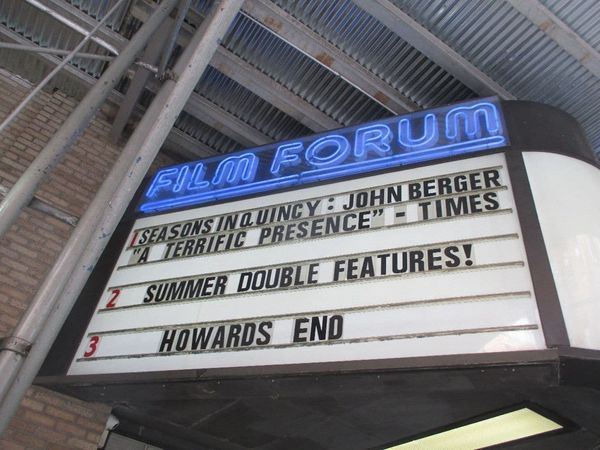 |
| Colin MacCabe on shooting Berger: "John absolutely refused to plan things." Photo: Anne-Katrin Titze |
Author, artist, self-declared storyteller John Berger is the focus of the intricately woven strands that make up The Seasons In Quincy: Four Portraits Of John Berger. Produced by The Derek Jarman Lab as a quartet of individual film essays, directed by Tilda Swinton, Christopher Roth, Bartek Dziadosz and Colin MacCabe, the combination allows for fascinating interplay of concerns.
On the opening day in New York, Colin MacCabe and I had a conversation that led from Berger's kitchen to Ken Loach's I, Daniel Blake, The Spectre Of Hope on Sebastião Salgado, Chris Marker, Neil Jordan collaborator Patrick McCabe, Isaac Julien, Roland Barthes, Jacques Derrida, Martin Heidegger, the editing by Christopher Roth and the cinematography of Bartek Dziadosz, apples, raspberries and cows, Brexit and Northern Ireland.
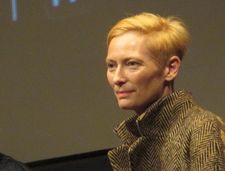 |
| Tilda Swinton: "As soon as we finished the first one, Tilda said, well, we've got to make three more!" Photo: Anne-Katrin Titze |
In the first part of The Seasons In Quincy, called Ways Of Listening, we join Swinton and Berger in his rural kitchen. It is the week before Christmas 2010 in Quincy, the small mountain village in the Haute-Savoie where Berger spent 40 years of his life. While Tilda is peeling apples, Berger draws her portrait and they talk - about fruit and their fathers who both remained silent about their war experiences. Berger, born in 1926 (on the same date as Swinton in 1960, November 5) remembers that when he was a toddler, his father, for breakfast, would "take an apple, cut it into quarters and then peel it," before feeding a piece to baby John.
The storytelling becomes a manual for Tilda as she continues to listen, about the infantry officer in the trenches of the Western Front of WWI, and she offers stories of her own father who lost a leg fighting in WWII and never referred to the injury. A shared birthday, a silent soldier father - bonding works in many forms. There is almost too much to see and hear at once.
There's Berger's wife Beverly coming into the kitchen; the kitchen itself is packed with interesting objects, the stories are textured, the subjects are self-conscious in front of the obvious camera at one moment and forget about it the next, plus, as a byproduct, Berger creates a drawing and Swinton an enormous apple crumble, lemony and hot.
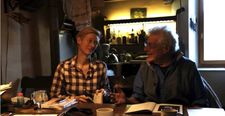 |
| Tilda Swinton with John Berger: "First of all, that kitchen is a kind of magical place..." |
Tilda reads his poem Self-portrait 1914-18. "I was born of the look of the dead - Swaddled in mustard gas - And fed in a dugout." We are never born the year of our birth. Berger and Swinton know the importance of trying to "identify stories good for the reader's health."
Anne-Katrin Titze: How is John doing?
Colin MacCabe: I mean, he is old. For the first time he is old. When we made the first film, he was 85, I suppose. It was astonishing. You wouldn't have called him old. Beverly's death was, I think, a huge blow. He came to Berlin [for the festival screening] and he got very ill. Probably if he hadn't come to Berlin, he would have died. Because he got ill in the middle of a big city and we got him straight to hospital and he's okay. He is 90 in November.
AKT: He is in Paris now?
CMC: Yeah, he is in Paris now.
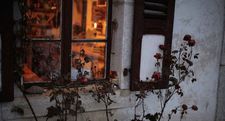 |
| Colin MacCabe on Self-portrait 1914-18: "Wonderful poem, yeah, which I didn't know before we went and shot it, actually." |
AKT: Let's begin with clearing up a bit of the confusion about who directed the four parts of the film. Part 2 [Christopher Roth] and 4 [Tilda Swinton] are clear. Did you direct part 1 and 3?
CMC: Depends what you mean by "direct". I produced a lot of films and I would even say I'm a very good producer. But I never had any desire to direct. Partly because I thought I would be absolutely hopeless at it. For the first one, it was very much Tilda who wanted to make it and I thought we would get a director.
Then Tilda said to me very forcefully that there were already three people in the conversation - which was John, her and me and she didn't think there was any need for a fourth. So I ended up directing it. I did know, in my opinion, the greatest editor in the world, and I rang him up and said, help me. And that was Christopher Roth. And he cut that fantastic film out of footage which I had nominally directed.
AKT: And he became also the director of part 2?
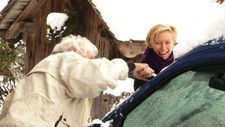 |
| Tilda Swinton laughs with John Berger: "When we got there in mid-December, literally a couple of hours before a blizzard snowed us in, we made a film about winter …" |
CMC: When we got there in mid-December, literally a couple of hours before a blizzard snowed us in, we made a film about winter - without thinking about it. As soon as we finished the first one, Tilda said, well, we've got to make three more! We got to make the other seasons. Then we thought Christopher should make the second one.
In the third one, I'm only named as director because the one that I personally was the most interested in, was the one on politics. All I had was the initial idea that it should be like a Fifties television program where [John Berger] made his career and where I first saw him.
The third part, A Song for Politics, unfolds around a discussion between Berger, MacCabe, and Roth, joined by writers Akshi Singh and Ben Lerner.
AKT: There is a brilliant moment in the third one and that is a pause. After John says "It's in Hell where solidarity is important - not in Heaven." And then the stunned look on all of your faces! It's great you left that in.
CMC: It was as you see it. We were all lost for words. And then we made the decision to leave that in because it's like a joke television program as well. In some ways it's meant to be quite funny.
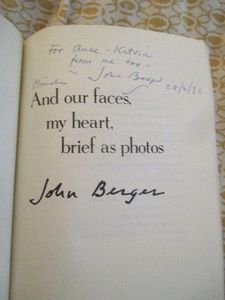 |
| And our faces, my heart, brief as photos inscribed by John Berger Photo: Anne-Katrin Titze |
AKT: It's funny but also profound. It's so true.
CMC: Yeah, yeah, yeah, absolutely.
AKT: I just saw I, Daniel Blake this week, Ken Loach's new film. This solidarity is exactly the point of it. Back to part 1 of your film. There is almost too much to see and hear at once.
CMC: Really?
AKT: You see so much in that kitchen! I was torn what to pay attention to. Especially when Tilda is reading the poem. Did you feel that whirlwind of things going on [she is making a pie, he is making a drawing, they talk about their fathers] while filming it?
CMC: First of all, that kitchen is a kind of magical place - was a magical place. I didn't want to direct it and I found directing unbelievably anxiogenic. So I was mainly full of anxiety the whole time. You don't see what the camera sees. It was only afterwards that Christopher Roth made me see the possibilities in it.
AKT: The Self-portrait 1914-18 poem is a wonderful poem.
CMC: Wonderful poem, yeah, which I didn't know before we went and shot it, actually.
AKT: That came out of the moment?
CMC: Yes, everything came out of the moment.
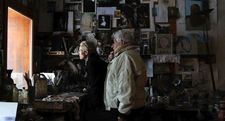 |
| John Berger looking out with Tilda Swinton |
AKT: Nothing was planned?
CMC: No, nothing was planned. John absolutely refused to plan things. I can't remember how that happened, whether Tilda knew that poem beforehand or whether it was just there and she picked it up.
AKT: The idea behind that poem is that we are never born the year of our birth. No?
CMC: Well, maybe. The very strong idea of that poem is that John is a post World War I baby. And the irony that the First World War in England - the slogan was "A world fit for heroes to live in." And, of course, it was the world of the depression and fascism.
Coming up - Colin MacCabe on The Derek Jarman Lab, the cinematography of Bartek Dziadosz, The Spectre Of Hope with Sebastião Salgado, Patrick McCabe, the Alpine trilogy, G., Why Look At Animals?, and introducing Tilda Swinton to John Berger.
The Seasons in Quincy: Four Portraits of John Berger is currently screening at Film Forum in New York City.





















